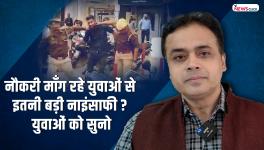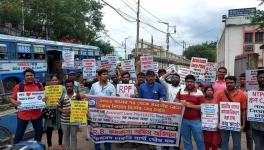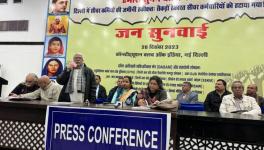Buses to Yellow Taxis to Car Pools – Transport Workers in Bengal Face Post-COVID Job Squeeze
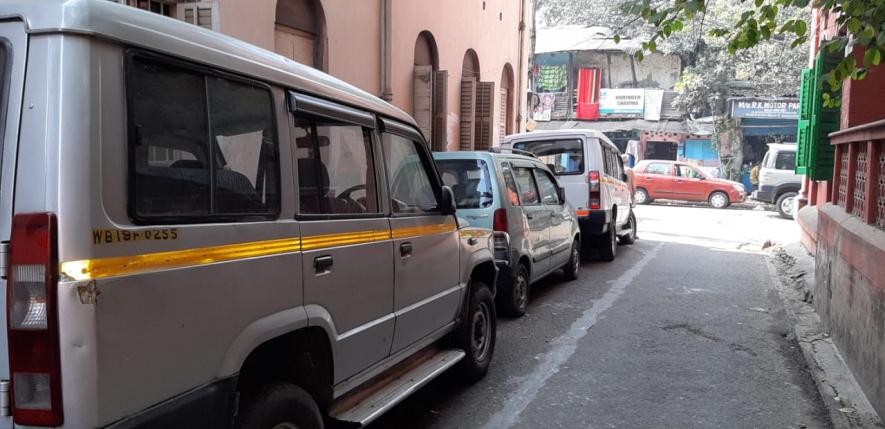
Kolkata: The life of one of the oldest car pool (school vehicles) owners, Sushovan Chatterjee, is in complete disarray. The 75-year-old operator of eight vehicles catering to a well-known school in South Kolkata is now waiting for all his vehicles to go to the scrapyard.
Before the pandemic-induced lockdown in March-end last year, all the eight vehicles owned by Chatterjee were in running condition. However, the closure of schools during lockdown has resulted in the entire car pool business (cars meant for ferrying school students with government permit) has gone down the drain, but the government still expects them to pay road tax.
In the city of Kolkata, there are about 3,000 car pool and contract carriage vehicles mainly catering to schools and offices, colleges, according to Jiban Saha of the Road Transport Workers Federation. In West Bengal as a whole, the number stands at nearly 10,000, with each vehicle employing nearly two staff members, translating to a total about 20,000 employees.
Left in the lurch, car pool service owners have been appealing to the state government for some relief, like not charging road tax, but to no avail. Arupam Datta, secretary of Pool Car Owner Association, said they have permits for vehicle usage in schools and universities, “so when these are closed on government orders, why is the government taking road tax on non-plying vehicles?”
“We had appealed to the state government seeking tax exemption but so far this has fallen on deaf ears,” said Datta, reflecting the mood prevailing in the entire transport sector of the state
Families of Laid-Off Workers in Dire Straits
In all, over a million persons are dependent on nearly 400,000 laid-off transport workers, whose life is in disarray with a single sub-sector (car pool) coming to a halt. Even conservative estimates put the total number of laid-off employees at more than 400,000, as the transport sector is known to employs a fair number of part-time workers, such as cleaners and helpers.
The lay-offs have dealt a cruel blow to the transport sector in the past one year, even as the government refuses to take a decision on tax holiday being demanded by car pool owners and long-distance bus owners who are merely following the COVID protocol.
Permanent and Contractual Staff: Pre- and Post-COVID Lockdown
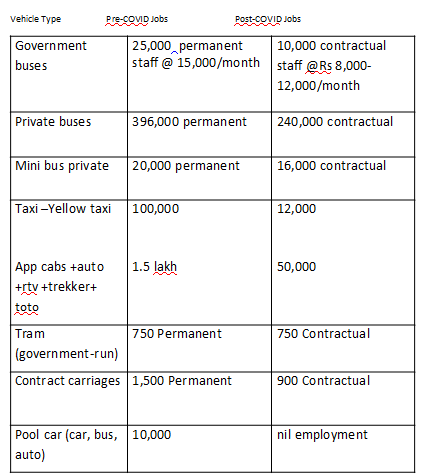

Note: Bus, auto and RTV (rural transport vehicles) are using fixed route rotation formula to survive
Source: West Bengal Road Transport Workers Federation, CITU, Evaluation by Indian Institute of Social Welfare and Business Management experts
Auto
Autos and RTVs ferry passengers in the state but there are no exact numbers of how many are plying in Kolkata even with the state transport department. Rough estimates put the number at over 20,000-30,000 owner-operators and drivers, with about a lakh total employment.
“We have to work daily to earn our ration. Social security is long due but who will give it to us now? On paper everything might exist, but to get one’s dues, one has to wear off one’s shoes” said Abesh Raut, an autorickshaw driver plying on the Jorabagan route.
According to Hafiz Ali, an auto driver on the Garia-Baruipur route, where nearly 1,500 autos ply daily, the earnings per day have come down drastically from pre-COVID days, which stood at Rs 700-1,000 a day to Rs 150-350/day in the post-COVID scenario. He says he has to pay Rs 350 to the owner at the end of the day, while he has to bear petrol expenses or repair costs, if any. Recovering this cost has become difficult, as schools and colleges are closed and most big offices are allowing employees to work from home.
Most of these autos are not even registered and ply under a unionised fixed route, while there are some which ply without unionised structure but under a fixed route structure. According to Subhas Mukherjee of the Road Transport Federation, there is “utter anarchy” in the auto sector in Kolkata, affecting lakhs of workers across in state, such as in Asansol, Silguri and Burdwan, which are major centres where autos and totos (e-rickshaws) ply.
Private Vehicles Ferry 76% of Passengers
Subhas Mukherjee, who is also president of the West Bengal Road Transport Workers Federation, said the downturn in the transport sector has been going on not just after the lockdown but right since Narendra Modi government brought in the Motor Vehicles Amendment Act wherein the onus of accidents was passed from owners to workers of the transport sector as well as de facto abolition of the Regional Transport Authority and start of an agency system under a central board.
“These irrational decisions have introduced total anarchy in the transport sector in West Bengal where private vehicles now ferry 76% passengers, state government buses carry 7-10% passengers and the rest travel by Indian Railways,” Mukherjee told NewsClick.
Government Buses Being ‘Neglected’
Mukerjee also pointed out that throughout the country, out of the 52 State Transport Undertakings (STUs), 47 are running losses to fill up the demand-supply gap in a welfare State. However, in West Bengal, after 2011, the state government has been pushing privatization through the backdoor.
Right now, the ruling Trinamool Congress (TMC) cadres are getting placed in the STU as contract workers, while appointments for government posts have been totally stopped.
Also, the state government has taken a decision to offload government land of transport depots for real estate purposes. Land belonging to three major depots has already been hived off to real estate agents. These corporations are now operating with 30% permanent workers and 70% contract workers.
What is more painful is that to decrease the number of public buses, the government is not allotting petrol to many buses in depots, said a government bus driver on the condition of anonymity.
Narugopal Saha, a bus conductor with Calcutta State Transport Corporation told NewsClick that if this sort of “handling of public transport system continues, then we all will become excess workers in government books and VRS (voluntary retirement scheme) will be forced upon us “.
Plight of Private Bus Workers
Workers employed in private buses, which are plying in large numbers, have to pay “per duty money” to union leaders daily, alleged a source, adding that to top it, the police harasses the workers on route, which further leads to depleted operating expenses, as a result of which buses cannot be run profitably.
At present, there are about 66,000 private buses plying across West Bengal. To run one bus, a set of six workers is required. Before the pandemic had set in, there were about 3,96,000 workers. With the number of running private buses now decreased to 40,000, there is requirement of about 2,40,000 workers, making over 1,56,000 workers redundant. Most of the workers are facing severe financial constraints and though Chief Minister Mamata Banerjee had announced Rs 1,000 as help till after the lockdown, the promise has not been kept.
Jibon Saha, a leader of the Centre of Indian Trade Unions (CITU), pointed out that the social security scheme started by the erstwhile Left Front government has nearly been discontinued, with bus workers rarely being able the get benefits due to them under the scheme.
Naresh Ojha, a former bus driver in No 45 route and now in No 80 route, told NewsClick that to avail these schemes that have now gone online, one needs to be both close to the ruling party coterie or go through middlemen, a path which most workers are reluctant to take. Ojha has now joined the Bharatiya Janata party (BJP) after a tryst with TMC, after the union which he belonged (led by CITU) came under attack in both these routes from rival unions belonging to the ruling party.
Several bus workers alleged that the entire Rs 1,000 crore road cess corpus, under which a fund was created to provide help to the families of bus workers, has been transferred to an amalgamated fund in the state exchequer and rarely do bus workers get any help as the workers’ welfare boards have been dissolved.
Many bus workers said they were now selling vegetables or standing in queue for jobs in the construction sector as workers, helpers of masons etc., while several others are still without any work.
Saha said many bus workers are changing unions after not getting social security dues thinking that the other union would arrange for their social security. But, at the end of day, nothing is coming out of this as the state government is not releasing funds for the same, he added.
Kolkata’s Famed Yellow Taxi – A Dying Breed
The famed yellow cab that defines Kolkata, popularly known as yellow taxi, is at the receiving end, with their number coming down from 70,000 in five districts around the capital city to about 6,000-8,000 that are now operating per day. The yellow taxi workers has protested against the police excesses as well as the government’s policies favouring cab-hailing apps Ola and Uber, however Ola and Uber have taken over their business.
The yellow taxi workers alleged this was because the TMC government was giving sops taxi apps and was working to close down the yellow taxi sector. Earlier, the yellow taxis employed nearly 100,000 people, but now their number has dwindled to less than 10,000 to 12000, said Anadi Sahoo, leader of apex body of several taxi workers unions.
Trams Pushed to Sidelines
Kolkata is the only city in the country where trams still run. However, however from 250 trams that were run per day earlier, now only 25 trams are running daily as tram lines in Kolkata have been reduced to make way for faster mode of transportation.
The Indian Railways, which employs over 110,000 employees in West Bengal, carried over three million passengers per day in local trains. The number of passengers has come down to 1.5 million post-COVID. In the organised sector, contract workers are increasing despite a strong unionised atmosphere in the Railways that was able to thwart illegal contract worker recruitment to some extent in the state, said SK Brahma of Railway worksmen union. Yet, jobs like painting are being outsourced on contract, Shuvendu Chatterjee, former president of Eastern Railwaymens Union told NewsClick.
Meanwhile, over 250,000 goods carrying vehicles are planning to go on strike in West Bengal in the coming days, said Sohan Singh Atiana of the All India Motor Transport Congress.
We will be protesting against the New Motor Vehicles Act, rising job insecurity, increasing oil prices, lack of sleep or rest plaguing the lakhs of workers in the goods vehicles that ply in the state, said Tapan Maulik of Janapath Paribahan Workers Union.
Get the latest reports & analysis with people's perspective on Protests, movements & deep analytical videos, discussions of the current affairs in your Telegram app. Subscribe to NewsClick's Telegram channel & get Real-Time updates on stories, as they get published on our website.









